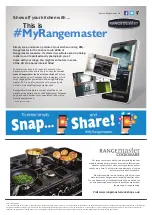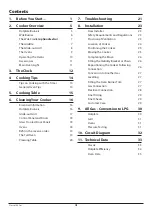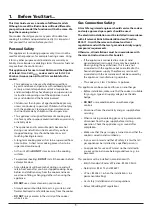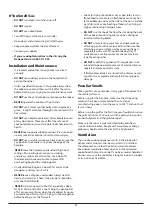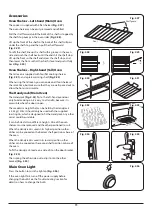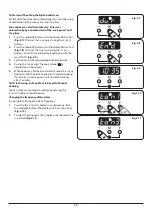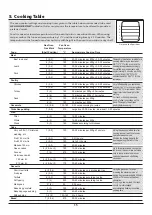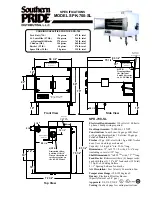
1
This User Guide covers a number of different models.
Although some of the illustrations will look different to
your particular model the functions will be the same. We
hope the meaning is clear.
Your cooker should give you many years of trouble-free
cooking if installed and operated correctly. It is important
that you read this section before you start.
Personal Safety
This appliance is for cooking purposes only. It must not be
used for other purposes, for example heating a room. Using
it for any other purpose could invalidate any warranty or
liability claim. Besides invalidating claims this wastes fuel and
may overheat the control knobs.
This appliance is for use in Great Britain and the Republic
of Ireland. It is a Cat II2H3+ cooker and is set for G20 at
20 mbar. (A conversion kit for LPG is available for the
cooker).
• This appliance can be used by children aged from
8 years and above and persons with reduced physical,
sensory or mental capabilities or lack of experience
and knowledge if they have been given supervision or
instruction concerning use of the appliance in a safe
way and understand the hazards involved.
• Children less than 8 years of age should be kept away
unless continuously supervised. Children shall not play
with the appliance. Cleaning and user maintenance
shall not be made by children without supervision.
• This appliance is designed for domestic cooking only.
Use for any other purpose could invalidate any warranty
or liability claim.
• The appliance and its accessible parts become hot
during use and will retain heat even after you have
stopped cooking. Care should be taken to avoid
touching heating elements.
• A long term cooking process has to be supervised from
time to time. A short term cooking process has to be
supervised continuously.
• At the risk of fire DO NOT store items on the cooking
surfaces.
• To avoid overheating, DO NOT install the cooker behind
a decorative door.
• Accessible parts will become hot during use and will
retain heat even after you have stopped cooking. Keep
babies and children away from the cooker and never
wear loose-fitting or hanging clothes when using the
appliance.
• DO NOT use a steam cleaner on your cooker.
• Always keep combustible materials, e.g. curtains, and
flammable liquids a safe distance away from the cooker.
• DO NOT spray aerosols in the vicinity of the cooker
while it is on.
Gas Connection Safety
A Gas Safe registered engineer should service the cooker
and only approved spare parts should be used.
The electrical installation must be installed in accordance
with all relevant British Standards/Codes of Practice,
BS 7671. Or with the relevant national and local
regulations and with the local gas and electricity supply
companies’ requirements.
Otherwise, all installations must be in accordance with
the relevant instructions in this booklet.
• If the appliance is connected to a solar or wind
generated electrical supply, there may be a problem
when igniting the oven burners. This issue is not
associated with the appliance but one related to the
household power supply. Therefore any service call
associated with this occurrence will not be covered by
the appliance / manufacturers guarantee.
• This cooker is a Class 2 Subclass 1 appliance.
This appliance can be converted for use on another gas.
• Before installation, make sure that the cooker is suitable
for your gas type and supply voltage. See the data
badge.
• DO NOT use reconditioned or unauthorised gas
controls.
• Disconnect from the electricity and gas supply before
servicing.
• When servicing or replacing gas-carrying components
disconnect from the gas supply before starting
operation. Check the appliance is gas sound after
completion.
• Make sure that the gas supply is turned on and that the
cooker is wired in and switched on.
• In your own interest and that of safety, it is law that all
gas appliances be installed by a qualified person(s).
• An appliance for use on LPG must not be installed in
a room or internal space below ground level, e.g. in a
basement.
This cooker must be installed in accordance with:
• British Standards/Codes of Practice, BS 5440 Part 2
• Natural Gas: BS 6172 and BS 6891
• LP Gas: BS 5482-1 (when the installation is in a
permanent dwelling)
• Gas Safety (Installation and Use) regulations
• Relevant Building/IET regulations
1. Before You Start...


